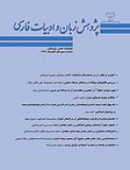تحليل تحول آرايههاي زيباييشناختي در شعر معاصر
محورهای موضوعی : پژوهشهای ادبیات کلاسیک ایران
1 -
2 -
کلید واژه: هنجارگریزی هنجارگریزی تصویری آرایههای زیباشناختی نظریه دریافت شعر معاصر,
چکیده مقاله :
تصویر به آن دسته از فعالیتهاي ذهنی گفته میشود که در فرایند آفرینش هنری، در قوهی خیال کشف میگردد. تصویر، عناصر بیگانهی طبیعت را به هم پیوند میدهد و با ابداع حس و فهم مشترک، نسبت میان انسان و طبیعت را از سطح «این نه آنی» به سطح «این همانی» ارتقا میدهد. این سطح از صورت بندیهاي خیال، فقط زمانی گریبان شاعر را میگیرد که شاعر، منطق متعارف مکالمه و مفاهمه را فاقد قابلیت لازم برای حسی کردن معانی و مضامین شهودی و انتزاعی و تجارب ناب ببیند. لذا زبان را با انحراف هنرمندانه از هنجار منطق محاوره و منطق مکاتبه که مبتنی بر دلالت مطابقی و کارکرد ارجاعی است، خارج می سازد و در سطح کارکرد شاعرانه بازسازی میکند. هر گاه انحراف غایتمند از هنجارها و قواعد حاکم بر زبان معیار صورت پذیرد، هنجارگریزی پدید می آید. این پژوهش بر آن است از رهگذر هنجارگریزی تصویری، تحول آرایه های زیباشناختی در شعر معاصر را مورد بررسی قرار دهد تا مشخص گرداند که شاعران معاصر تا چه حد با استفاده از تصویرسازیهاي ادبی و آرایه های زیباشناختی از اشیا و پدیده ها عادت زدایی میكنند و به کلامشان صبغه ی هنری می بخشند. آیزر از نظریه پردازان نظریهی دریافت، آگاهانه تأکید نهادن بر جنبههاي زیباشناختی اثر را - که موجب کثرت معنایی و هنجارگریزی تصویری میگردد- برمیگزیند.
The present research is about multiple head phrase and its aesthetic functions in Mehdi Akhavan Sales' poetry. The research has been conducted deductively. One of the linguistic introductory materials in Akhavan's poetry is to use multiple head phrase in order to extend the constituents of speech and to elaborate it. Establishing lexical or semantic relations between the two head of the multiple head phrase that has been made using ‘apposition’, Akhavan makes them function as the elements of foregrounding linguistic structures, and as the aesthetic elements of poetry. The main functions of such phrases in Akhavan's poems are defamiliarization, foregrounding, leading the referential language to the poetic one, and creating beauty. Some other aesthetic functions of multiple head phrase in Akhavan's poems are to lead the language of the poems to elaboration, to describe the antecedents of the appositions, and to create an aesthetic distance between reason and emotion. Stressing the main poetic function of the multiple head phrase - which is to create the illusion of identity between the entities of different types- Akhavan selects opposition among the set of "abstract entities, objects, plants, liquids', and coordinates them with their antecedents. Doing so, he provides beautiful images which rely on creating the illusion of sameness between the entities having features of different values such as: + abstract/ - abstract, + concrete/ - concrete, + plants/ - plants, + liquid/ - liquid, and etc.


